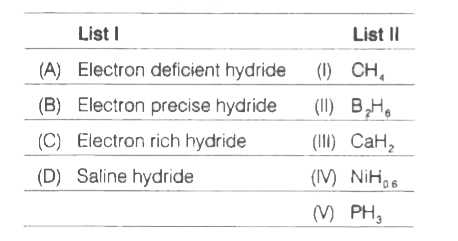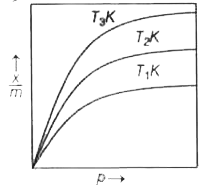Complete Solutions to CHEMISTRY of chapter AP EAMCET SOLVED PAPER 2018 ( 23-04-2019,SHIFT -1) of Class 12 book with complete answers and questions
| Class 12 | CHEMISTRY |
| Chapter | AP EAMCET SOLVED PAPER 2018 ( 23-04-2019,SHIFT -1) |
| TS EAMCET | CHEMISTRY |
| Number Of Questions | 40 |
| Academic Year | 2023-24 |
The ratio of the de-Broglie wavelengths of two particles having mass ratio `1 : 3` and kinetic energy ratio `2 : 1` is
01:48View SolutionIf uncertainities in the measurement of position and momentum of a microscopic object of mass 'm' are equal, then the uncertaintry in the measurement of velocity is given by the expression
01:31View SolutionIn lanthanides, with increase in atomic number atomic radius decreases, except for the element X. what is X ?
01:31View SolutionDipole moment order of which of the following pairs of molecules is not correct ?
02:53View Solution`ul(X) and ul(Y)` are the two covalent molecules in which the hybridisation of the central atoms is same, but shapes are different. `ul(X) and ul(Y)` are
03:20View SolutionAt same temperature and pressure, the rate of diffusion of gas 'X' is `3 sqrt3` times that of a gaseous hydrocarbon of molar mass `54g mol^(-1)`. The molar mass of X in `g mol^(-1)` is
02:26View SolutionFrom the given reaction `2KMnO_(4) + 3H_(2)SO_(4) + 5H_(2)O_(2) rarr K_(2)SO_(4) + 2MnSO_(4) + 8H_(2)O + 5O_(2)`
Find the normality of `H_(2)O_(2)` solution, if 20 mL of it is required to react completely with 16 mL of 0.02M `KMnO_(4)` solution (Molar mass of `KMnO_(4) = 158 g mol^(-1)`)04:29View SolutionAt the temperature T(K) for the reaction `X_(2)O_(4) (l) rarr 2XO_(2)(g) Delta U = x kJ mol^(-1), Delta S = y JK^(-1) mol^(-1)`. Gibbs energy change for the reaction is (Assume `X_(2)O_(4), XO_(2)` are ideal gases) `Delta U = x kJ mol^(-1), Delta S = y JK^(-1) mol^(-1)`
02:13View SolutionArrange the aqueous solution of the following salts in the increasing order of pH
`underset(I)(CuSO_(4)) " " underset(II)(NaCN) " " underset(III)(KCl)`02:23View SolutionFor the gaseous reactions (I) and (II) the equilibrium constants are X and Y respectively.
I. `(1)/(2)N_(2)(g) + O_(2) (g) hArr NO_(2)(g)`
(II) `2NO_(2)(g) hArr N_(2)O_(4) (g)` Using the above reactions the equilibrium constant Z for the reaction (III) given below is
III. `N_(2)O_(4)(g) hArr N_(2)(g) + 2O_(2) (g)`01:56View SolutionMatch the following

The correct answer is03:08View SolutionBe and Al show similarities in properties due to diagonal relationship except in the property `ul(X)` given below. What is `ul(X)` ?
02:28View SolutionIn the strucute of `B_(2)H_(6)`, the number of `BH_(2)` groups present in one plane, and the number of `B-H` bonds, B-B bonds, B-H-B bridge bonds are respectively
02:35View SolutionIdentify the incorrect statements from the following.
I. Tin in +2 state acts as reducing agent while lead in +4 state acts as strong oxidising agent.
II. Silicon exists as both `[SiF_(6)]^(2-) and [SiCl_(6)]^(2-)` forms.
III. The hybridisation of carbon in fullerence is `sp^(3)`
IV. Among Ge, Sn and Pb lowest melting point is for Sn.03:09View SolutionMethane of the polluted air reacts with ozone and forms the compounds.
00:56View SolutionAssertion (A) Propene on addition with hydrogen bromide in the presence of peroxide gives 1-bromopropane as the major product.
Reason (R ) 1-bromopropane is the major product because it is formed through the stable carbocation.
The correct answer is02:15View SolutionWhich of the following represents the hyperconjugation effect ?
03:10View SolutionHexane `underset(underset(10-20atm)(773K))overset(Cr_(2)O_(3))rarr X underset("Anyhdrous" AlCl_(3))overset(CH_(3)COCl)rarr Y` Y in the above sequence of reaction is
01:55View SolutionA metal crystallises in two phases, one as fcc and other as bcc with unit cell edge length of `3.5 Å and 3.0 Å` respectively. The ratio of density of fcc and bcc phases approximately is
03:23View SolutionWhen 36g of a non-volatile, non-electrolytic solute having the empirical formula `CH_(2)O` is dissolved in 1.2 kg of water, the solution freezes at `-0.93^(@)C`. The molecular formula of the solute is (`K_(f)` of water = 1.86 K kg `mol^(-1)`)
03:34View SolutionBenzene and toluene form an ideal solution over the entire range of composition. The vapour pressure of pure benzene and toluene at T(K) are 50mm Hg and 40 mm Hg respectively. What is the mole fraction of toluene in vapour phase when 117 g of benzene is mixed with 46g of toluene? (molar mass of benzene and toluene are 78 and `92 g mol^(-1)` respectively).
04:55View SolutionThe rate equation for a first order reaction is given by `[R] = [R]_(0) e^(-kt)`. A straight line with positive slope is obained by plotting `[R]_(0)`= initial concentration of reactant, [R] = concentration of reactant at time, t
01:49View SolutionFor the oxidation of 0.2 M `FeSO_(4)` solution 0.965 amperes current is passed through it for 1 hour. The volume of the solution that is oxidised in mL is
03:21View SolutionFreundlich adsorption isotherms for the physical adsorption of a gas at temperature `T_(1), T_(2) and T_(3)` are shown in the graph given below. The correct relationship between `T_(1), T_(2) and T_(3)` is
 01:31View Solution
01:31View SolutionThe ore which is concentrated by leaching
01:23View SolutionHot concentrated sulphuric acid on reaction with which one of the following elements, produces two gaseous products ?
01:54View SolutionThe pair of xenon compounds which have same number of lone pairs of electrons on the central atom is
02:19View SolutionWhich of the following statements are correct ?
I. `P_(4)` molecule is very reactive because of angular strain.
II. The basicity of `H_(3)PO_(3)` is 3.
III. In gas phase, all P-Cl bonds of `PCl_(5)` have same bond length.
IV. In solid state, `PCl_(5)` exists as an ionic solid, in which anion `[PCl_(6)]^(-)` has octahedral and cation `[PCl_(4)]^(+)` has tetrahedral shape.03:19View SolutionArrange the following ligands in the order of increasing field strength.
`{:(H_(2)O,CO,NH_(3),I^(-),F^(-)),(I,II,III,IV,V):}`01:59View SolutionFor which one of the following elements, `M^(3+)|M^(2+)` standard electrode potential is more positive ?
03:03View SolutionWhich one of the following structures represents the neoprene rubber?
01:28View SolutionThe type of bond connecting two nucleotides is
02:52View Solution
The correct statements about Z from the following are:
I. It is o-hydroxybenzoic acid.
II. It is a non-narcotic analgesic.
III. It acts as antipyretic.
IV. It acts as antihistamine.02:23View SolutionIdentify the halogen exchange reaction from the following.
02:45View SolutionWhich of the following structures represents cumene?
00:41View SolutionIn which of the following reactions, benzaldehyde is formed from benzoyl chloride and hydrogen in the presence of `Pd-BaSO_(4)`?
01:21View SolutionThe reagent used for the conversion of allyl alcohol to propenal is
03:19View SolutionThe compound which does not respond to iodoform test is
02:21View SolutionWhich of the following reactions does not represent the aldol condensation reaction ?
02:49View SolutionThe amine which does not react with chloroform and ethanolic potassium hydroxide is
02:04View Solution
CHEMISTRY questions and complete solutions for chapter AP EAMCET SOLVED PAPER 2018 ( 23-04-2019,SHIFT -1) of TS EAMCET PREVIOUS YEAR PAPERS of Class 12
